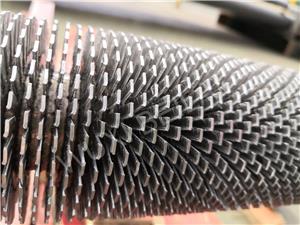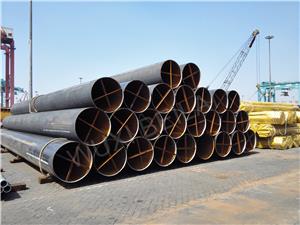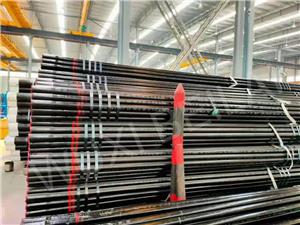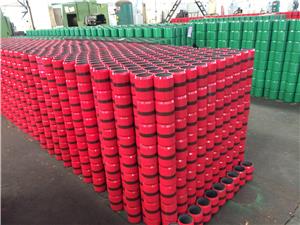¿El vinagre limpiará el óxido de las tuberías de perforación?
Rust poses a significant problem for metal structures and tools, particularly those frequently exposed to moisture, such as drill pipes. These pipes are essential components in drilling operations across various sectors, including oil and gas, geothermal, and water well drilling. Their prolonged contact with water, minerals, and oxygen accelerates corrosion, which, if not addressed promptly, can undermine the pipe's integrity, resilience, and longevity. Not only does rust diminish the strength of metal, but it can also obstruct the pipes, resulting in increased maintenance expenses and operational downtime.
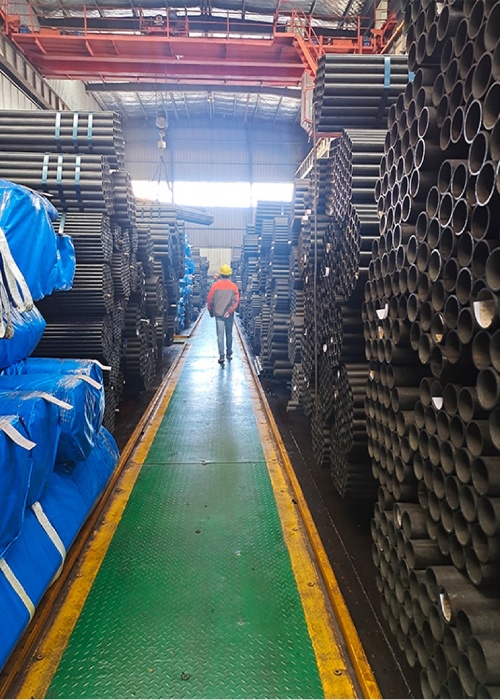
While commercial rust removers are popular in industrial settings, some prefer simpler, more affordable solutions like vinegar. Known for its mild acidity, vinegar is a readily available household item touted for rust removal on a smaller scale. But can it effectively clean rust off drill pipes? In this article, we explore how vinegar works for rust removal, whether it’s suitable for general drill pipe maintenance, and alternative methods to consider.
How Vinegar Removes Rust
Vinegar, especially white vinegar, is composed of acetic acid, a gentle acid capable of dissolving rust (iron oxide). When applied to metal that has rusted, acetic acid interacts with iron oxide, resulting in the formation of water-soluble salts. This action loosens the rust, facilitating its removal through scrubbing. This method, referred to as an acid-base reaction, is particularly effective for eliminating surface rust without harming the underlying metal, rendering it ideal for a range of rust removal applications.
For drill pipes, which often have extensive rust due to continuous exposure to water and minerals, the acetic acid in vinegar may effectively remove surface-level corrosion. However, it is essential to remember that vinegar’s rust removal capabilities are limited to light to moderate rust. The depth of the rust and the pipe's material, along with the exposure duration, affect the vinegar's effectiveness. For heavily rusted pipes or pitting, vinegar alone may not suffice, and additional treatments or even more potent solutions might be required.
How to Use Vinegar on Drill Pipes for Rust Removal
While vinegar can work for general rust removal on drill pipes, it requires a process that includes soaking, scrubbing, and neutralizing to ensure effective results. Here’s how to use vinegar to clean drill pipes:
1. Prepare Materials: You will need white vinegar, a container large enough to hold or soak sections of the drill pipe, a brush (ideally a stiff-bristled one), gloves, and a neutralizing agent like baking soda. For large-scale applications, consider concentrating vinegar by diluting it less, as this increases the acetic acid concentration.
2. Soak the Rusted Pipe Sections: Pour enough vinegar into a container to submerge the rusted sections of the drill pipe. Depending on the extent of the rust, allow the pipe to soak for 12 to 24 hours. For smaller patches of rust, soaking for several hours may suffice.
3. Scrub Off the Rust: After soaking, use the brush to scrub away the loosened rust. Be cautious not to scratch or damage the pipe’s surface. This step may require some effort, especially for pipes with thicker rust layers.
4. Rinse and Neutralize: Thoroughly flush the drill pipe with water to eliminate any traces of vinegar and rust particles. Subsequently, concoct a mixture of baking soda and water to neutralize any residual acetic acid. This procedure is instrumental in averting the rapid onset of flash rust, a phenomenon that can affect newly cleaned metal surfaces if acidic remnants persist.
5. Dry Thoroughly: Finally, ensure the pipe is thoroughly dried to avoid re-rusting. Wipe it down with a clean, dry cloth or leave it in a warm area with good airflow.
This process should effectively remove light to moderate rust from the drill pipes. For deep corrosion or heavy rust, additional rounds of treatment or alternative methods might be necessary.
Advantages and Limitations of Using Vinegar on Drill Pipes
Utilizing vinegar to remove rust offers a range of advantages and disadvantages, particularly when it is used on drill pipes.
Advantages
1.Affordable and Accessible: Vinegar, being cost-effective and readily available, emerges as an economical solution for the removal of rust.
2.Eco-Friendly Choice: Utilizing vinegar as a natural cleaning agent, one avoids introducing detrimental chemicals into the ecosystem, rendering it a safer alternative to certain commercial rust removers.
3.Mild and Gentle: The moderate acidity of vinegar is less prone to damage metal surfaces than stronger acids, aiding in the preservation of the drill pipe's structural integrity.
Limitations
1.Limited to Surface Rust: Vinegar is effective primarily for surface-level rust. For deeply rusted or pitted drill pipes, vinegar may not penetrate deeply enough, and more potent treatments might be necessary.
2.Time-Consuming: Vinegar typically necessitates prolonged periods of soaking and numerous applications, rendering it less suitable for extensive rust removal on large-scale drill pipe sections.
3. Risk of Flash Rust: If not thoroughly neutralized and dried, vinegar can cause flash rusting due to residual acid. Proper neutralization and drying are essential to avoid re-rusting.
For routine, light maintenance tasks, vinegar serves as an effective remedy. Nevertheless, when dealing with severely corroded pipes, professional rust removal treatments are likely to be more practical.
Alternative Rust Removal Methods for Drill Pipes
While vinegar can be effective for small-scale rust removal, some alternatives are better suited for large or severely rusted drill pipes. Here are a few common methods used in industrial settings:
1. Commercial Rust Removers: These products often contain stronger acids or chelating agents specifically designed to dissolve rust quickly and efficiently. Many commercial rust removers are designed for industrial use and may also contain rust inhibitors to prevent immediate re-rusting after treatment.
2. Sandblasting: This technique employs a mechanical approach that involves propelling abrasive materials, such as sand or other granules, at high pressure to remove rust from metal surfaces. Particularly effective on severely corroded pipes, sandblasting necessitates the use of specialized equipment and adherence to safety protocols. Subsequent to the process, it is crucial to apply a protective coating or paint to the pipes to safeguard against future corrosion.
3. Electrolysis: Electrolysis is a chemical process that employs electric currents to eliminate rust from metallic surfaces. It is both effective and precise, enabling the removal of rust without causing harm to the metal. Nevertheless, electrolysis necessitates a setup that includes a power source and an electrolyte solution, and it is generally conducted in a controlled environment. Consequently, this method is more appropriate for severe rust and pitting on smaller components rather than on extensive sections of drill pipe.
4. Mechanical Scrubbing Tools: Wire brushes, power sanders, and grinding tools are effective for manually or mechanically removing rust. Although this approach can be quite laborious, it proves particularly useful for treating small areas and localized rust spots. Following the scrubbing process, it is essential to apply a rust-inhibiting coating to safeguard the metal's integrity.
5. Rust Inhibitor Coatings: Post-rust removal, it is crucial to apply a rust-preventive coating, such as paint, oil, or industrial coatings. These inhibitors safeguard the pipe against further oxidation and prolong its lifespan.
Each of these methods presents its own set of advantages and disadvantages, contingent upon the condition of the drill pipe, the equipment at hand, and the desired outcomes. In the case of routine maintenance, vinegar may suffice. However, for pipes that are severely rusted, sandblasting or commercial treatments are likely to be more efficient and enduring.
Vinegar proves to be an effective solution for removing rust from drill pipes, particularly when dealing with light to moderate levels of corrosion. Through a process of soaking and scrubbing the affected areas, it can efficiently eliminate surface rust without the reliance on abrasive chemicals. This environmentally friendly method is not only cost-effective but also easily accessible, making it ideal for small-scale projects or minor rust issues. Consequently, it presents a suitable choice for the upkeep of individual drill pipes in less severe instances.
However, for deeply rusted or heavily corroded drill pipes, vinegar may not provide adequate cleaning. In such cases, commercial rust removers, sandblasting, or electrolysis are often better options, offering more powerful results for extensive rust removal. Whatever method is chosen, protecting drill pipes from future rust by applying a protective coating post-cleaning is essential, especially if the pipes will continue to be exposed to moisture or corrosive environments.

